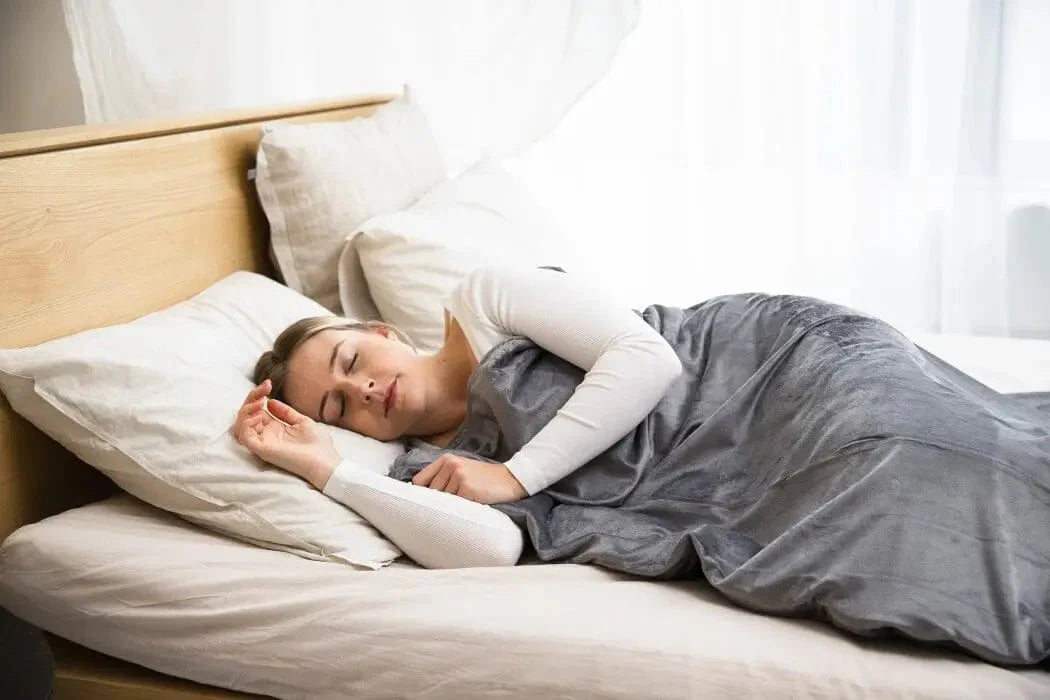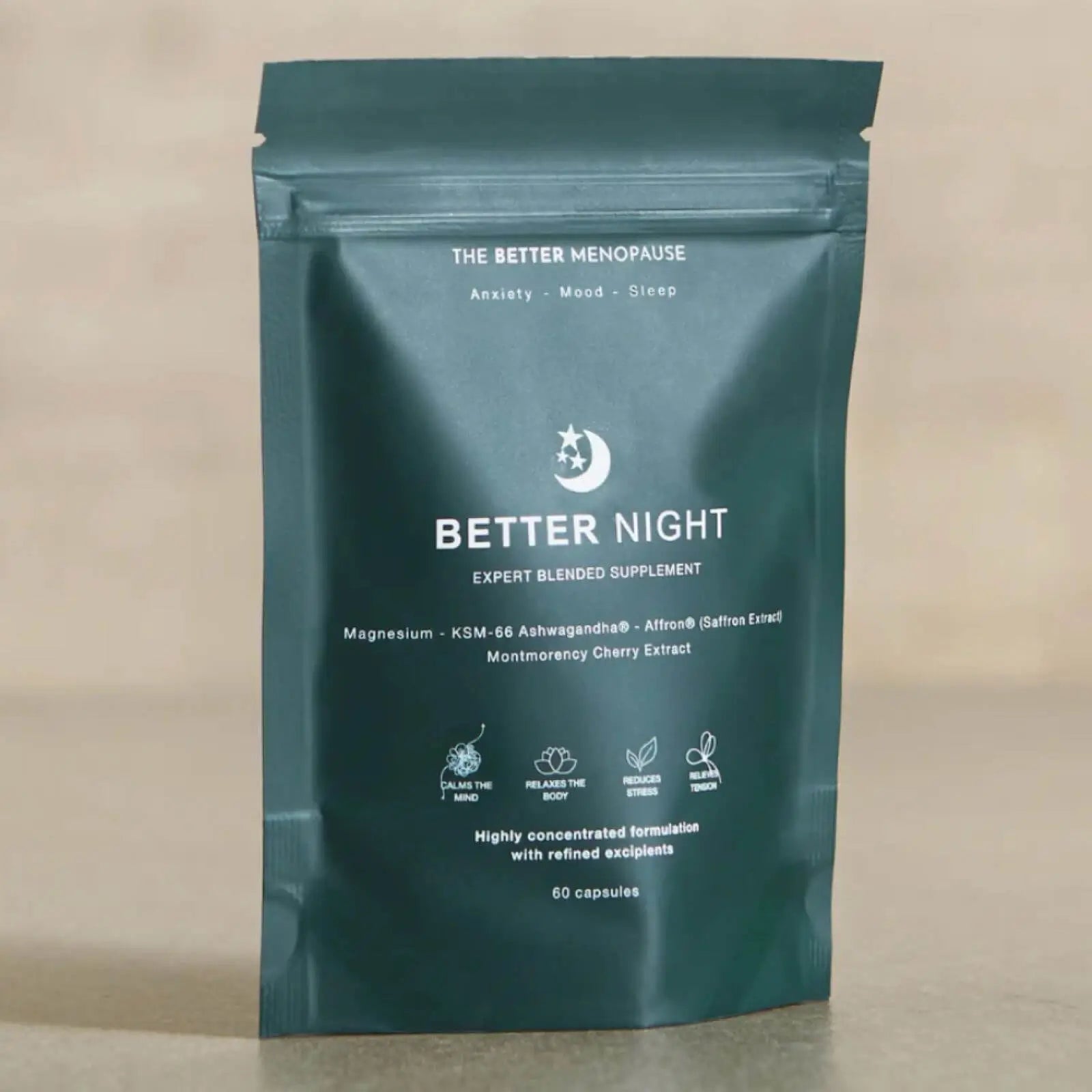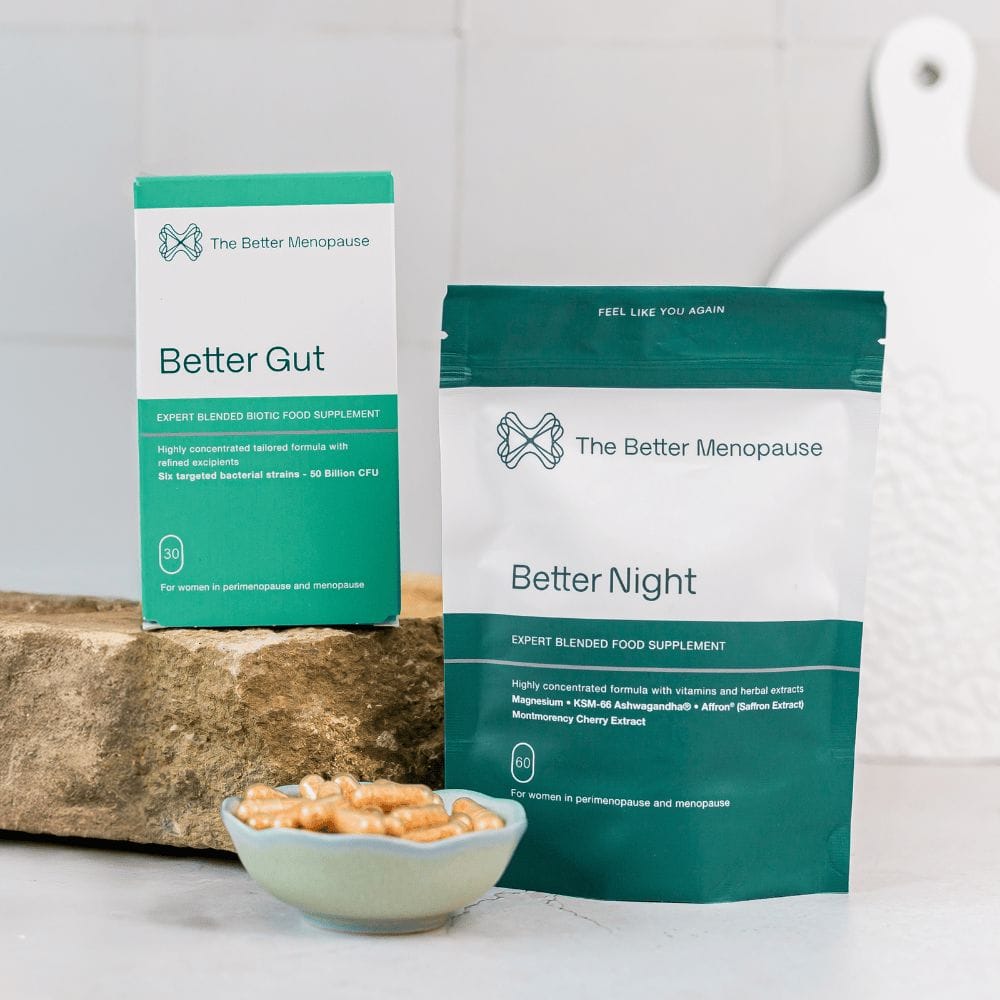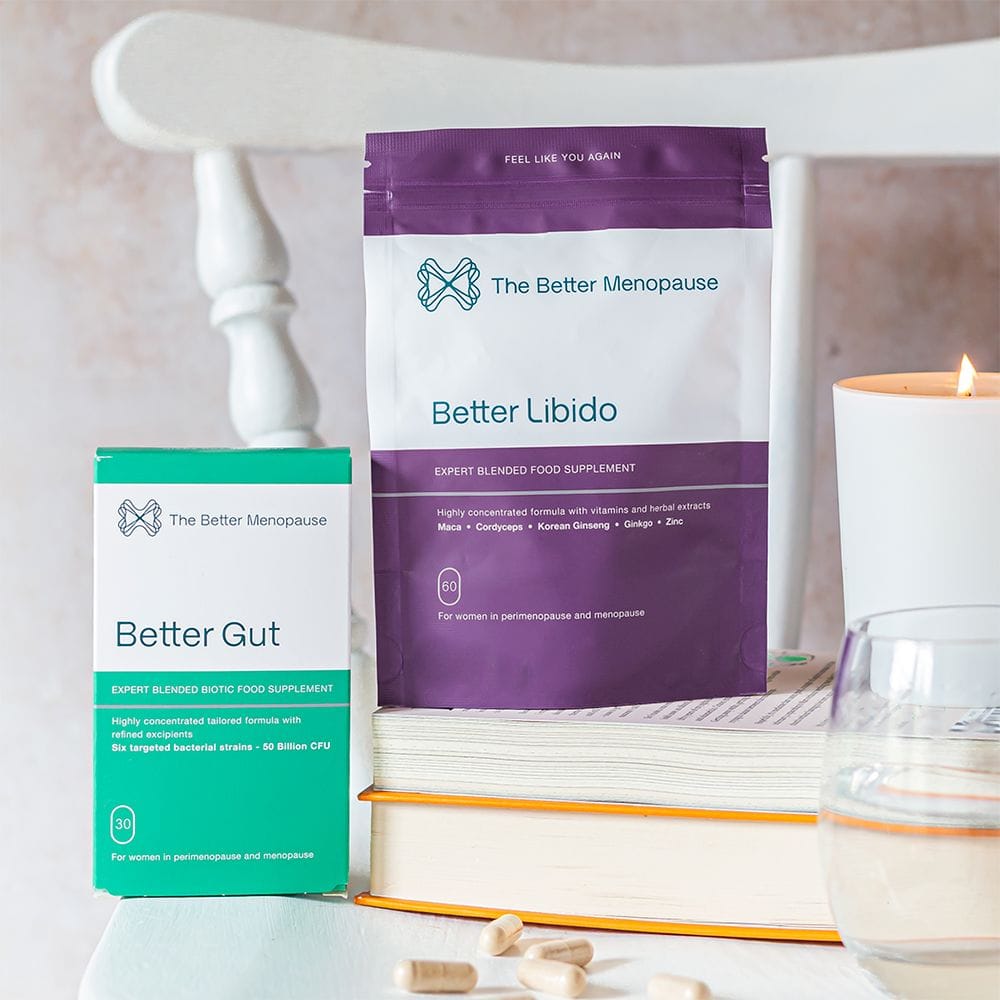
How menopause affects your sleep, and how you can improve it
Exploring the links between menopause, perimenopause and sleep problems, plus the natural remedies, treatments and supplements that could help.
If you’re wondering whether menopause could be contributing to your sleep problems, the answer is yes. Insomnia and sleep disturbances become more common during perimenopause and menopause, and studies have shown this is not just to do with getting older.
Changing hormone levels, along with other menopause symptoms like hot flashes, anxiety and sleep apnoea, can all play a part.
The good news is there are things that may help, from healthy lifestyle changes and mindfulness practices to herbal remedies and other supplements.
Along with these, we’ll look at the roles of hormone replacement therapy and over-the-counter sleeping pills, and consider how long menopause sleeping problems might last without treatment.
One natural way to manage disturbed sleep during menopause is with Better Night, an expert blend of powerful adaptogens, herbs, vitamins and minerals to help improve mood, reduce anxiety, relieve tension and support a better night's sleep.
What causes sleep problems during menopause?
Menopause is the time 12 months after your last period, when reproductive hormones like oestrogen and progesterone have settled at their lowest point. Perimenopause is the years leading up to menopause, when levels of these hormones are still fluctuating.
Changing levels of reproductive hormones such as oestrogen and progesterone can influence the quality of your sleep in a variety of ways.
Progesterone has a calming, relaxing effect on your mind and body, and plays an important role in your sleep cycle. Low progesterone can cause disturbed sleep.
Oestrogen may have a less direct impact on your sleep, but reduced levels are responsible for many other common menopause symptoms that can cause sleep problems.
Another hormone, melatonin, also decreases during the menopause transition. Melatonin regulates your sleep-wake cycle, and some researchers think low levels could contribute to problems like insomnia.
Hot flashes
Hot flashes or night sweats are instances of sudden heat and sweating across your face, neck or chest. They’re a major cause of sleep disturbances for menopausal women.
Clinical studies suggest that almost 80% of hot flashes are linked to waking up. But while most women report that their hot flashes cause them to wake, physiological measurements show that hot flashes often happen just after waking.
What’s more, you may not always realise that you’ve had a hot flash. In fact, some women aren’t aware that they get hot flashes at night at all. So it’s possible hot flashes could be disturbing your sleep without you knowing it.
Sleep apnoea
Sleep apnoea is when your breathing stops and starts during your sleep. Women have a much higher risk of developing sleep apnoea after menopause and scientists believe this may be related to hormonal changes.
Symptoms of sleep apnoea include loud snoring, making gasping or choking sounds and waking up a lot. It can be helpful to ask someone to check for these signs while you’re asleep. Other possible symptoms of sleep apnoea are waking up with a headache, tiredness, mood swings and trouble concentrating.
If you think you may have sleep apnoea, talk to your doctor.
Anxiety
Increased anxiety is another common symptom of perimenopause and menopause. This may be partly due to the effect of changing levels of hormones such as oestrogen on the neurotransmitters that help regulate your mood.
It’s no surprise that feelings of worry or fear like this can disturb your sleep. Poor sleep can also lead to worse anxiety, creating a vicious circle.
Restless legs syndrome
Restless legs syndrome (RLS) is an uncomfortable sensation in your legs accompanied by an intense need to move them. As you might expect, it can make getting to sleep difficult.
RLS is more common during menopause. Some research suggests that this may be due to the impact that changing oestrogen levels have on the neurotransmitter dopamine.
Ethnicity and menopause sleep problems
A number of factors can influence your personal experience of menopause and, when it comes to sleep problems, that may include your ethnicity.
Studies have found that while women of white or Asian descent tend to experience more disturbed sleep during perimenopause and after menopause, Hispanic women don’t see a change.
Natural remedies to help you sleep better during menopause
Lifestyle changes and mindfulness practices could improve your sleep and your overall health. There’s also some encouraging evidence that certain herbal remedies may help.
Lifestyle changes
- Get regular exercise: Studies have shown that making regular exercise part of your routine can significantly improve menopause sleep problems like insomnia. Both resistance work (like weight training, bodyweight exercises or using resistance bands) and cardio (such as brisk walking, running, swimming or cycling) have can help with sleep as you get older. For the best results, try to include some of each.
- Improve your diet: A balanced diet can help with sleep problems during menopause, as well as other symptoms that can contribute to them, like hot flashes and anxiety. To get the right blend of plant compounds, healthy fats and fibre, eat a wide range of whole plant foods, including leafy green vegetables and legumes like beans and pulses, as well some oily fish and poultry. Choose whole grains over refined versions like white rice, bread and pasta, and limit food and drink containing added sugar.
- CBT and mindfulness: Cognitive behavioural therapy (CBT) is a kind of mindful talking therapy that helps you identify and break out of negative thought patterns. A type of CBT specially designed to help with insomnia (CBT-I) has been shown to significantly reduce sleep problems in postmenopausal women. In the UK, you can get CBT on the NHS. Other mindfulness practices, like meditation, breathing exercises and yoga can reduce anxiety, helping you to sleep better.
- Improve your sleep routine: You can give yourself a better chance of a good night’s sleep by learning some good bedtime habits: go to bed, and get up, at the same time each day; avoid caffeine after lunch and limit alcohol; keep your room dark and cool; stop using your phone and other devices an hour before bed; if you get hot flashes, keep cold water and a fan by your bed.
- Stop smoking: Nicotine is a stimulant and it leads to cravings, both of which can keep you awake at night. Smoking also increases your risk of breathing problems and has been specifically linked to insomnia during menopause. Quitting can be challenging but there’s lots of help and support available.
Herbal remedies
- Ashwagandha: The root of this shrub is a staple of traditional Ayurvedic medicine. Studies have shown that daily ashwagandha supplements can help you get to sleep more easily, sleep for longer and wake up later, as well as reducing anxiety.
- Chamomile: Research suggests that supplements containing extracts of this flowering plant can improve sleep, including for women who have been through menopause. Chamomile tea may also help with anxiety.
- Lemon balm: In traditional Middle Eastern medicine, this fragrant herb is used for its sedative properties. Studies suggest that taking daily supplements containing lemon balm extract may help to improve sleep quality in some menopausal women.
- Passionflower: Another natural sedative, passionflower is available as a tea or in supplements. There’s some evidence that it can help with sleep, as well as related menopause symptoms, including low mood and hot flashes.
- Tart cherry: This variety of cherry is high in antioxidants called anthocyanins. It’s often consumed as a juice. In small studies, people who drank concentrated tart cherry juice each day slept longer and better and had higher levels of melatonin.
Take a look at our dedicated article, which goes into more detail about these herbal remedies for menopause sleep problems.
Over the counter sleeping pills and supplements for menopause
You can buy both herbal and chemical sleeping pills at your pharmacy. The plant ingredients in herbal pills often include hops and valerian. The most common active ingredient in chemical pills is the antihistamine diphenhydramine hydrochloride.
Although both of these over-the-counter products may help you to sleep in the short term, they won’t cure insomnia and should not be used regularly for more than a week or two as you can become dependent on them.
In the US, diphenhydramine is not recommended for use by older people and some studies suggest that taking it regularly can increase your risk of developing dementia.
Other supplements that may help with sleep during menopause include:
- Probiotics: Studies have shown that the specific strains of friendly bacteria found in The Better Gut probiotic supplements can help with menopause symptoms including sleep problems, anxiety and night sweats.
- L-theanine: Supplements containing a concentrated form of this amino acid may help you get to sleep more quickly and sleep for longer. Studies have found they can improve overall sleep quality for postmenopausal women.
- 5-HTP: Another amino acid, 5-HTP – full name L-5-hydroxytryptophan – helps you produce melatonin. Research has shown that 5-HTP supplements can help older people with insomnia, but that the effects wear off after a few months.
- Magnesium: This essential mineral is involved in regulating your body clock. There’s evidence that magnesium supplements can help older people to get better sleep and increase their melatonin levels.
- PEA: Palmitoylethanolamide (PEA) is a type of fat molecule that plays a role in sleep. According to one study, PEA supplements can help you get to sleep and improve your mental sharpness the next day.
- Melatonin: Your brain produces the hormone melatonin in response to darkness. Melatonin regulates your body clock and helps with sleep. If you’re over 55 and have insomnia, your doctor may prescribe melatonin supplements for a short time.
Does HRT help with sleep?
Hormone replacement therapy (HRT) uses pills, gels or skin patches to replace hormones like oestrogen and progesterone lost during menopause.
There’s been plenty of research looking at the impact of HRT on sleep and, on the whole, women tend to find that it reduces their sleep problems and improves the quality of their sleep.
Although results are slightly more mixed when it comes to laboratory measures of sleep quality, they generally show that women using HRT have less broken sleep.
HRT is also effective at reducing hot flashes, which are one of the main causes of sleep problems.
You can talk to your doctor about trying HRT.
How long does menopause insomnia last?
Every woman’s experience of the menopause transition is unique and exactly how long your insomnia lasts could depend on a number of factors.
If you’re experiencing insomnia or other sleep problems during perimenopause, it may be due to fluctuating hormones.
In this case, your symptoms could go away as your head towards menopause and your hormones drop to a stable level. Perimenopause generally lasts for between 4 and 8 years.
However, low – rather than fluctuating – oestrogen and progesterone have both been linked to insomnia. If this is what’s behind your symptoms during perimenopause, they could continue into menopause when your levels reach their lowest.
If you’ve only experienced sleep problems since you reached menopause, this could also mean they won’t necessarily go away on their own.
That’s where the lifestyle changes and other approaches we’ve looked at could help.
Summary
Sleep problems are a common symptom of menopause and perimenopause, partly due to changing hormone levels.
This can also lead to other symptoms that contribute to poor sleep, such as hot flashes, anxiety, sleep apnoea and restless legs syndrome.
Lifestyle changes, such as getting regular exercise, eating a healthier diet, improving your sleep routine and quitting smoking, could all help. Cognitive behavioural therapy focused specifically on insomnia can also be an effective treatment.
There’s evidence that certain herbal remedies and other supplements could improve your sleep too.
You should only use over-the-counter sleeping pills occasionally and for short-term relief. If you have recurring insomnia or other menopause symptoms, your doctor may suggest hormone replacement therapy.






